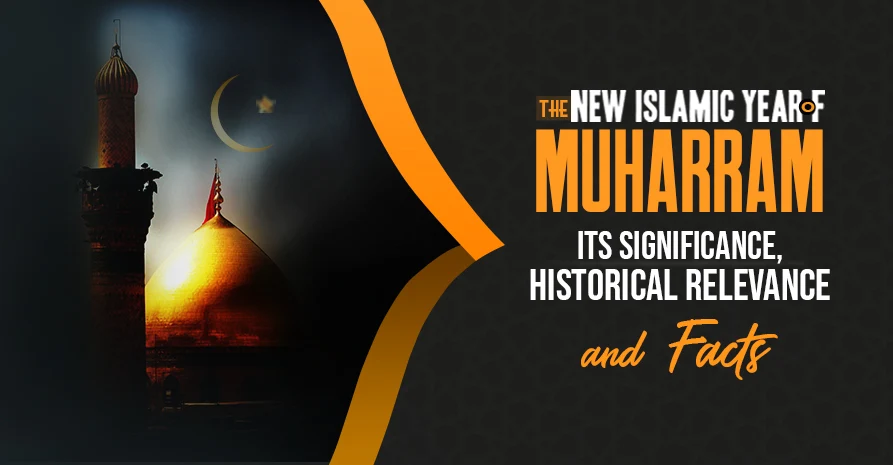-
Umrah Packages
- Most Selling
- By Rating
- Umrah By months
- Popular cities
- Exclusive Deals
- Yearly Packages
- hajj Packages
- Halal Holidays
- Guide
- Contact Us
- Inquire us

Muharram is commemorated as the beginning of the Islamic New Year by Muslims all around the world. The community regards it as a holy and significant tradition. For Muslims, it is one of four holy months of the year. Muharram implies "forbidden," and because it is deemed sacred, several Muslims embrace it as a time of prayer and meditation. It is customary for members of the community to fast throughout the holy month of Muharram. Muharram also recalls the battlefield of Karbala, where the grandson of Prophet Muhammad (S.A.W), Imam Hussain ibn Ali (R.A), was assassinated. On the 10th day of Ashura, they recall the killing. Most people choose to fast on this day. In the field of Karbala, he was cruelly murdered by a harsh and repressive ruler. Though Imam Hussain (R.A) was killed in the combat, his teachings of compassion, justice, and equity linger on in the hearts of those who love him, and this is his true triumph.
Good actions are rewarded in abundance by Allah (SWT), the Prophet (S.A.W) advocated voluntary fasting for Muslims. It is mention in a Quranic verse that:
Moreover, it’s also mentioned in a Hadith narrated by Abu Bakr that:
All of Islam's months are sacred, with Ramadan being the holiest. However, these four described in the above hadith have been singled out because they were revered by pagan communities before the Prophet (S.A.W) was born.
The true history of Muharram grieving is a terrible one. The violent Battle of Karbala apparently happened on the 10th of Muharram, also known as Ashura, in the 61st year of the Muslim calendar. A tiny group of followers and relatives of Prophet Muhammad's (S.A.W) grandson, Imam Hussain (R.A), battled against a considerably bigger army of Yazid I, the Umayyad caliph. Imam Hussain's armed forces were made up of solely his friends and relatives, comprising women and little children. However, they were encircled by a well-equipped enemy force numbering in the thousands. They seized Hussain and his friends and starve them of food and water for three days in a row in the heat of the summer. Hussain and his 6-year-old kid were mercilessly murdered by the troops, who seized the ladies as hostages. It is an extremely emotional tragedy, and Muslims observe a grieving period in the month of Muharram to respect the sacrifices of lost lives.
On the day of mourning, Shia Muslims lament the loss of Imam Hussein and his family, who died during the month of Muharram. They honor their sacrifice by praying frequently and abstaining from any joyful activities. The grieving phase begins on the first of Muharram and lasts for ten days until Imam Hussein's (R.A) demise day. They lament by dressing in black, abstaining from erotic behavior, fasting, and finally breaking their fast on Ashura, the 10th day. Many of them even breach their fast just after zawal (afternoon), when they pay their respects to Imam Hussein (R.A) by publicly flogging themselves with shackles, stabbing themselves with knives and other objects, and staging sorrowful communal rallies. This sad vigil is a representation of their mourning at the loss of their Imam Hussain (R.A), who is also seen as Allah's representative.
Muharram, or the Islamic New Year, is a time for worship and contemplation on the hardships that resulted in the establishment of Islamic belief. The New Year is a moment to ponder on the previous year and plan positively towards the next year. There is a distinction between how Shia and Sunni Muslims spend Muharram. It is a somber moment for Shia Muslims since it marks the start of the 10-day sorrow time following up to the Day of Ashura. Fasting is observed by the faith to grieve the martyrdom of Imam Hussein and his family and friends, as well as to acknowledge the efforts made during the Battle of Karbala. Shia Muslims likewise abstain from participating and enjoying any happy activities during this time. Most Shias indulge in gatherings and self-flagellation. Mourners utilize harmful items including swords or chains with blades affixed to them, as well as other items, in actions of absolution while shouting 'Ya Hussein' enthusiastically. On the contrary, his day is observed peacefully by Sunni Muslims, who refrain from eating or drinking until sundown. They also congregate to honor Imam Hussein's (R.A) contributions and perform special prayers in Masjids.
Here are some of the facts regarding the Islamic new year starting from Muharram that Muslims should be aware of:
The start of the Islamic new year is a grieving period for the Muslim community. They tend to pray and ask forgiveness to Allah Almighty. As a good deed, they feed the poor and help them in every aspect. Shia Muslims also punish themselves by beating their bodies to mourn the loss. So, the month of Muharram holds great importance in the lives of Muslims.